Table of Content
Lakshmi Stotram
![mahalakshmi in red saree]()
नमस्तेस्तू महामाये श्रीपिठे सूरपुजिते ।
शंख चक्र गदा हस्ते महालक्ष्मी नमोस्तूते ॥१॥
नमस्ते गरूडारूढे कोलासूर भयंकरी ।
सर्व पाप हरे देवी महालक्ष्मी नमोस्तूते ॥२॥
सर्वज्ञे सर्ववरदे सर्वदुष्ट भयंकरी ।
सर्व दुःख हरे देवी महालक्ष्मी नमोस्तूते ॥३॥
सिद्धीबुद्धूीप्रदे देवी भुक्तिमुक्ति प्रदायिनी ।
मंत्रमूर्ते सदा देवी महालक्ष्मी नमोस्तूते ॥ ४ ॥
आद्यंतरहिते देवी आद्यशक्ती महेश्वरी ।
योगजे योगसंभूते महालक्ष्मी नमोस्तूते ॥ ५ ॥
स्थूल सूक्ष्म महारौद्रे महाशक्ती महोदरे ।
महापाप हरे देवी महालक्ष्मी नमोस्तूते ॥ ६ ॥
पद्मासनस्थिते देवी परब्रम्हस्वरूपिणी ।
परमेशि जगन्मातर्र महालक्ष्मी नमोस्तूते ॥७॥
श्वेतांबरधरे देवी नानालंकार भूषिते ।
जगत्स्थिते जगन्मार्त महालक्ष्मी नमोस्तूते ॥८॥
महालक्ष्म्यष्टकस्तोत्रं यः पठेत् भक्तिमान्नरः ।
सर्वसिद्धीमवाप्नोति राज्यं प्राप्नोति सर्वदा ॥९॥
एककाले पठेन्नित्यं महापापविनाशनं ।
द्विकालं यः पठेन्नित्यं धनधान्य समन्वितः ॥१०॥
त्रिकालं यः पठेन्नित्यं महाशत्रूविनाशनं ।
महालक्ष्मीर्भवेन्नित्यं प्रसन्ना वरदा शुभा ॥११॥
॥ इतिंद्रकृत श्रीमहालक्ष्म्यष्टकस्तवः संपूर्णः ॥
Ashta Lakshmi Stotram
![mahalakshmi on her lotus]()
आदि लक्ष्मी
सुमनस वन्दित सुन्दरि माधवि चंद्र सहोदरि हेममये ।
मुनिगण वन्दित मोक्षप्रदायिनी मंजुल भाषिणि वेदनुते ।
पङ्कजवासिनि देवसुपूजित सद-गुण वर्षिणि शान्तिनुते ।
जय जय हे मधुसूदन कामिनि आदिलक्ष्मि परिपालय माम् ।
धान्य लक्ष्मी:
अयिकलि कल्मष नाशिनि कामिनि वैदिक रूपिणि वेदमये ।
क्षीर समुद्भव मङ्गल रुपिणि मन्त्रनिवासिनि मन्त्रनुते ।
मङ्गलदायिनि अम्बुजवासिनि देवगणाश्रित पादयुते ।
जय जय हे मधुसूदनकामिनि धान्यलक्ष्मि परिपालय माम् ।
धैर्य लक्ष्मी:
जयवरवर्षिणि वैष्णवि भार्गवि मन्त्र स्वरुपिणि मन्त्रमये ।
सुरगण पूजित शीघ्र फलप्रद ज्ञान विकासिनि शास्त्रनुते ।
भवभयहारिणि पापविमोचनि साधु जनाश्रित पादयुते ।
जय जय हे मधुसूदन कामिनि धैर्यलक्ष्मि सदापालय माम् ।
गज लक्ष्मी:
जय जय दुर्गति नाशिनि कामिनि वैदिक रूपिणि वेदमये ।
रधगज तुरगपदाति समावृत परिजन मंडित लोकनुते ।
हरिहर ब्रम्ह सुपूजित सेवित ताप निवारिणि पादयुते ।
जय जय हे मधुसूदन कामिनि गजलक्ष्मि रूपेण पालय माम् ।
सन्तान लक्ष्मी:
अयि खगवाहिनी मोहिनि चक्रिणि रागविवर्धिनि ज्ञानमये ।
गुणगणवारिधि लोकहितैषिणि सप्तस्वर भूषित गाननुते ।
सकल सुरासुर देव मुनीश्वर मानव वन्दित पादयुते ।
जय जय हे मधुसूदन कामिनि सन्तानलक्ष्मि परिपालय माम् ।
विजय लक्ष्मी:
जय कमलासनि सद-गति दायिनि ज्ञानविकासिनि गानमये ।
अनुदिन मर्चित कुङ्कुम धूसर भूषित वसित वाद्यनुते ।
कनकधरास्तुति वैभव वन्दित शङ्करदेशिक मान्यपदे ।
जय जय हे मधुसूदन कामिनि विजयक्ष्मि परिपालय माम् ।
विद्या लक्ष्मी:
प्रणत सुरेश्वरि भारति भार्गवि शोकविनाशिनि रत्नमये ।
मणिमय भूषित कर्णविभूषण शान्ति समावृत हास्यमुखे ।
नवनिद्धिदायिनी कलिमलहारिणि कामित फलप्रद हस्तयुते ।
जय जय हे मधुसूदन कामिनि विद्यालक्ष्मि सदा पालय माम् ।
धन लक्ष्मी:
धिमिधिमि धिन्धिमि धिन्धिमि-दिन्धिमी दुन्धुभि नाद सुपूर्णमये ।
घुमघुम घुङ्घुम घुङ्घुम घुङ्घुम शङ्ख निनाद सुवाद्यनुते ।
वेद पुराणेतिहास सुपूजित वैदिक मार्ग प्रदर्शयुते ।
जय जय हे कामिनि धनलक्ष्मी रूपेण पालय माम् ।
अष्टलक्ष्मी नमस्तुभ्यं वरदे कामरूपिणि ।
विष्णुवक्षःस्थलारूढे भक्तमोक्षप्रदायिनी ।।
शङ्ख चक्र गदाहस्ते विश्वरूपिणिते जयः ।
जगन्मात्रे च मोहिन्यै मङ्गलम शुभ मङ्गलम ।
। इति श्री अष्टलक्ष्मी स्तोत्रम सम्पूर्णम ।
Lakshmi Stotram Lyrics
![Goddess Lakshmi and God Vishnu]()
Namastesstu Mahamaye Shri Pithe Sur Pujite |
Shankh Chakra Gada Haste Mahalakshmi Namostute ||1||
Namaste Garudarudhe Kolasura Bhayankari |
Sarva Pap Hare Devi Mahalakshmi Namostute ||2||
Sarvajne Sarva Varade Sarva Dushta Bhayankari |
Sarva Dukh Hare Devi Mahalakshmi Namostute ||3||
Siddhi Buddhiprade Devi Bhukti Mukti Pradayini |
Mantramurte Sada Devi Mahalakshmi Namostute || 4 ||
Adyantarhite Devi Adyashakti Maheshwari |
Yogaje Yogasambhute Mahalakshmi Namostute || 5 ||
Sthula Sukshma Maha Raudre Maha Shakti Mahodare |
Maha Pap Hare Devi Mahalakshmi Namostute || 6 ||
Padmasana Sthite Devi Parabrahma Swarupini |
Parameshi Jagan Matar Mahalakshmi Namostute ||7||
Shwetambaradhare Devi Nana Lankara Bhushite |
Jagatstithit Jagan Matar Mahalakshmi Namostute ||8||
Mahalakshmyashtakastotram Yah Pathet Bhaktimannarah |
Sarvasiddhimavapnoti Rajyam Prapnoti Sarvada ||9||
Ekakale Pathennityam Maha Pap Vinashanam |
Dvikaalam Yah Pathennityam Dhanadhanya Samanvitah ||10||
Trikalam Yah Pathennityam Maha Shatru Vinashanam |
Mahalakshmirbhavennityam Prasanna Varada Shubha ||11||
Iti Indra Krit Sri Mahalakshmyashtaka Stava Sampurnah.
Lakshmi Stotram in Kannada
![Goddess lakshmi and elephants]()
ಓ ಮಹಾ ಭ್ರಮೆಯುಳ್ಳವನೇ, ನೀನು ಅದೃಷ್ಟ ದೇವತೆಯ ಆಸನದ ಮೇಲೆ ಕುಳಿತು ದೇವತೆಗಳಿಂದ ಪೂಜಿಸಲ್ಪಡುವೆ.
ನಿನ್ನ ಕೈಯಲ್ಲಿ ಶಂಖ, ಚಕ್ರ ಮತ್ತು ಗದ್ದಲ ಹಿಡಿದಿರುವ ಮಹಾ ಲಕ್ಷ್ಮಿಯೇ, ನಿನಗೆ ನನ್ನ ನಮನಗಳು.
ಓ ಭಯಂಕರ ಕೋಲಾಸುರನೇ, ಹದ್ದಿನ ಮೇಲೆ ಸವಾರಿ ಮಾಡುತ್ತಿರುವೆ, ನಾನು ನಿನಗೆ ನನ್ನ ನಮನಗಳನ್ನು ಸಲ್ಲಿಸುತ್ತೇನೆ.
ಓ ಮಹಾಲಕ್ಷ್ಮಿ ದೇವಿಯೇ, ಎಲ್ಲಾ ಪಾಪಗಳನ್ನು ನಿವಾರಿಸುವವಳೇ, ನಾನು ನಿನಗೆ ನನ್ನ ನಮನಗಳನ್ನು ಸಲ್ಲಿಸುತ್ತೇನೆ.
ಅವಳು ಎಲ್ಲವನ್ನೂ ತಿಳಿದಿದ್ದಾಳೆ ಮತ್ತು ಎಲ್ಲಾ ಆಶೀರ್ವಾದಗಳನ್ನು ನೀಡುತ್ತಾಳೆ ಮತ್ತು ಎಲ್ಲಾ ದುಷ್ಟರಿಗೆ ಭಯಾನಕವಾಗಿದೆ.
ಓ ಮಹಾಲಕ್ಷ್ಮಿಯೇ, ಎಲ್ಲಾ ದುಃಖಗಳನ್ನು ನಿವಾರಿಸುವವಳೇ, ನಾನು ನಿನಗೆ ನನ್ನ ನಮನಗಳನ್ನು ಸಲ್ಲಿಸುತ್ತೇನೆ.
ಅವಳು ಪರಿಪೂರ್ಣತೆ ಮತ್ತು ಬುದ್ಧಿವಂತಿಕೆಯನ್ನು ನೀಡುತ್ತಾಳೆ ಮತ್ತು ಆನಂದ ಮತ್ತು ವಿಮೋಚನೆಯನ್ನು ನೀಡುತ್ತಾಳೆ.
ಮಂತ್ರಗಳ ರೂಪದಲ್ಲಿ ಸದಾ ಇರುವ ಮಹಾಲಕ್ಷ್ಮಿ ದೇವಿಯೇ, ನಿನಗೆ ನನ್ನ ನಮನಗಳನ್ನು ಸಲ್ಲಿಸುತ್ತೇನೆ. 4 ॥
ಆದಿ ಅಂತ್ಯವಿಲ್ಲದ ದೇವಿಯೇ ಮೂಲ ಶಕ್ತಿಯಾದ ಮಹೇಶ್ವರಿ.
ಓ ಮಹಾನ್ ಅದೃಷ್ಟದ ದೇವತೆ, ನೀವು ಎಲ್ಲಾ ಅತೀಂದ್ರಿಯ ಶಕ್ತಿಯ ಮೂಲವಾಗಿದ್ದೀರಿ. 5 ॥
ಓ ಸ್ಥೂಲ, ಸೂಕ್ಷ್ಮ, ಅತ್ಯಂತ ಭಯಾನಕ, ಮಹಾನ್ ಶಕ್ತಿಶಾಲಿ, ಮಹತ್ತರವಾದ ಹೊಟ್ಟೆ.
ಓ ಅದೃಷ್ಟದ ದೇವತೆಯೇ, ಓ ಮಹಾಪಾಪಿಯೇ, ನಿನಗೆ ನನ್ನ ಗೌರವಪೂರ್ವಕ ನಮನಗಳನ್ನು ಸಲ್ಲಿಸುತ್ತೇನೆ. 6 ॥
ಕಮಲದ ಆಸನದ ಮೇಲೆ ಕುಳಿತಿರುವ ದೇವಿಯು ಪರಮ ಬ್ರಹ್ಮನ ಮೂರ್ತರೂಪವಾಗಿದೆ.
ಓ ಸರ್ವೋತ್ತಮ ದೇವಿಯೇ, ಬ್ರಹ್ಮಾಂಡದ ತಾಯಿಯೇ, ಓ ಮಹಾ ಲಕ್ಷ್ಮಿಯೇ, ನಾನು ನಿನಗೆ ನನ್ನ ನಮನಗಳನ್ನು ಸಲ್ಲಿಸುತ್ತೇನೆ.
ದೇವಿಯು ಬಿಳಿಯ ವಸ್ತ್ರವನ್ನು ಧರಿಸಿ ವಿವಿಧ ಆಭರಣಗಳಿಂದ ಅಲಂಕರಿಸಲ್ಪಟ್ಟಳು.
ಓ ಮಹಾಲಕ್ಷ್ಮಿಯೇ, ವಿಶ್ವದಲ್ಲಿ ನೆಲೆಸಿರುವ, ಬ್ರಹ್ಮಾಂಡದಿಂದ ವಿಚಲಿತಳಾದ, ನಾನು ನಿನಗೆ ನನ್ನ ನಮನಗಳನ್ನು ಸಲ್ಲಿಸುತ್ತೇನೆ.
ಅಷ್ಟರಮಟ್ಟಿಗೆ ಅದೃಷ್ಟ ದೇವತೆಯ ಈ ಸ್ತೋತ್ರವನ್ನು ಭಕ್ತಿಯಿಂದ ಪಠಿಸುವ ಯಾರಾದರೂ
ಅವನು ಎಲ್ಲಾ ಪರಿಪೂರ್ಣತೆಗಳನ್ನು ಪಡೆಯುತ್ತಾನೆ ಮತ್ತು ಎಲ್ಲಾ ಸಮಯದಲ್ಲೂ ರಾಜ್ಯವನ್ನು ಪಡೆಯುತ್ತಾನೆ.
ಮಹಾಪಾಪಗಳ ನಾಶಕ್ಕಾಗಿ ಪ್ರತಿನಿತ್ಯ ಈ ಮಂತ್ರವನ್ನು ಒಮ್ಮೆ ಪಠಿಸಬೇಕು.
ಈ ಮಂತ್ರವನ್ನು ದಿನಕ್ಕೆ ಎರಡು ಬಾರಿ ಪಠಿಸುವವನು ಸಂಪತ್ತು ಮತ್ತು ಧಾನ್ಯವನ್ನು ಹೊಂದುತ್ತಾನೆ.
ಈ ಮಂತ್ರವನ್ನು ದಿನಕ್ಕೆ ಮೂರು ಬಾರಿ ಪಠಿಸುವವನು ದೊಡ್ಡ ಶತ್ರುಗಳನ್ನು ನಾಶಮಾಡುತ್ತಾನೆ
ಮಹಾ ಲಕ್ಷ್ಮಿಯು ಸದಾ ಸಂತೋಷವಾಗಿರಲಿ ಮತ್ತು ವರಗಳನ್ನು ಕೊಡುವವಳು.
॥ ಇದು ಇಂದ್ರನಿಂದ ರಚಿಸಲ್ಪಟ್ಟ ಶ್ರೀಮಹಾಲಕ್ಷ್ಮಿಯ ಸಂಪೂರ್ಣ ಸ್ತೋತ್ರವಾಗಿದೆ.
Shri Lakshmi Stotram in Telugu
![Mahalakshmi and her gada]()
ఓ గొప్ప భ్రాంతివాడా, నీవు అదృష్ట దేవత యొక్క ఆసనంపై కూర్చుని దేవతలచే పూజించబడుతున్నావు.
చేతిలో శంఖం, చక్రం, గద పట్టుకుని ఉన్న ఓ మహా లక్ష్మీ, నీకు నా ప్రణామాలు.
ఓ భయంకరమైన కోలాసురా, డేగపై స్వారీ చేస్తున్నా, నీకు నా ప్రణామాలు.
ఓ మహాలక్ష్మీ దేవి, సర్వపాపాలను పోగొట్టుదామా, నీకు నా ప్రణామాలు.
ఆమె ప్రతిదీ తెలుసు మరియు అన్ని దీవెనలను ప్రసాదిస్తుంది మరియు దుర్మార్గులందరికీ భయంకరమైనది.
ఓ మహాలక్ష్మీ దేవి, సర్వ బాధలను తొలగించేది, నీకు నా ప్రణామాలు.
ఆమె పరిపూర్ణత మరియు తెలివితేటలను ప్రసాదిస్తుంది మరియు ఆనందాన్ని మరియు విముక్తిని ప్రసాదిస్తుంది.
మంత్రాల రూపంలో ఎల్లప్పుడూ ఉండే ఓ మహాలక్ష్మీ దేవి, నీకు నా ప్రణామాలు. 4 ॥
ఆది, అంతం లేని దేవత అసలు శక్తి మహేశ్వరి.
ఓ గొప్ప అదృష్ట దేవత, మీరు అన్ని ఆధ్యాత్మిక శక్తికి మూలం. 5 ॥
ఓ స్థూల, సూక్ష్మ, మహా భయంకరమైన, గొప్ప శక్తిగల, గొప్ప ఉదర.
ఓ అదృష్ట దేవత, ఓ మహా పాపాత్మా, నీకు నా గౌరవప్రదమైన ప్రణామాలు. 6 ॥
పద్మాసనంపై ఆసీనులైన అమ్మవారు సర్వోన్నత బ్రహ్మ స్వరూపిణి.
ఓ సర్వోన్నత దేవత, విశ్వానికి తల్లి, ఓ గొప్ప లక్ష్మీ, నీకు నా ప్రణామాలు.
అమ్మవారిని తెల్లని వస్త్రాలు ధరించి వివిధ ఆభరణాలతో అలంకరించారు.
ఓ విశ్వమాత, ఓ విశ్వం యొక్క బాధ, ఓ గొప్ప లక్ష్మీ, నీకు నా ప్రణామాలు.
అష్టదిశల అదృష్ట దేవత యొక్క ఈ స్తోత్రాన్ని భక్తితో పఠించే ఎవరైనా
అతను అన్ని పరిపూర్ణతలను పొందుతాడు మరియు అన్ని సమయాలలో రాజ్యాన్ని పొందుతాడు.
మహాపాపాలను నశింపజేయడానికి ప్రతిరోజూ ఈ మంత్రాన్ని ఒక్కసారైనా పఠించాలి.
ఈ మంత్రాన్ని రోజూ రెండుసార్లు పఠించేవాడు సంపద మరియు ధనాన్ని పొందుతాడు.
ఈ మంత్రాన్ని రోజూ మూడుసార్లు పఠించేవాడు గొప్ప శత్రువులను నాశనం చేస్తాడు
గొప్ప లక్ష్మి ఎప్పుడూ సంతోషంగా మరియు శుభప్రదంగా వరాలను ప్రదానం చేస్తుంది.
॥ ఇది ఇంద్రుడు రచించిన శ్రీమహాలక్ష్మి యొక్క పూర్తి స్తోత్రం.
Sgnificance of Lakshmi Stotram
![mahalakshmi in idol form]()
The Lakshmi Stotram, particularly the Sri Mahalakshmi Ashtakam, is a devotional hymn dedicated to Goddess Lakshmi, also known in Hindu tradition as the Goddess of Good Fortune, Beauty, Abundance, Prosperity, and Harmony. Recitation of this stotram is significant as it is believed to bring wealth and harmony to one's life and alleviate sorrows caused due to the lack of money.
The term 'Ashtakam' refers to the eight stanzas that make up this particular hymn. Each stanza describes and praises one of the eight divine forms of Goddess Lakshmi. These forms represent different aspects of life and prosperity, and devotees believe that reciting the hymn can attract blessings associated with each of these forms into their lives.
The simplicity and profundity of the stotram's lyrics make it widely appealing. As such, the hymn is often used in daily prayers and rituals, and holds a special place during the Diwali season, a Hindu festival of lights celebrated across India.
Therefore, the significance of the Lakshmi Stotram traces back to its fundamental purpose: it's a devotional tool that conveys profound respect and dedication to Goddess Lakshmi. Reciting it is considered a spiritual practice believed to bring blessings of prosperity and tranquility into one's life.
When To Chant Lakshmi Stotram?
The ideal time to chant the Lakshmi Stotram, particularly the Sri Mahalakshmi Ashtakam, as per tradition, occurs during Suklapanchh, Purnimatithi, Chandravalli, and Subhnachhtra. These timings correspond to auspicious lunar phases in the Hindu calendar. Suklapanchh refers to the bright half of the lunar month, a period considered auspicious. Purnimatithi is the full moon day, Chandravalli represents a phase when the moon has a favorable placement, and Subhnachhtra refers to auspicious constellations.
However, it is also acceptable to chant the Stotram at any time when the devotee feels a need for the grace of the goddess to cleanse the path of obstacles and invite prosperity and wealth. The Stotram is even commonly recited during Diwali, a widely celebrated festival dedicated to Goddess Lakshmi in India.
Benefits of Lakshmi Stotram
Chanting the Lakshmi Stotram, particularly the Sri Mahalakshmi Ashtakam, is believed to bring a number of spiritual and material benefits to the devotee. These benefits stem from the Divine qualities of Goddess Lakshmi, the Hindu deity of abundance, prosperity, and beauty.
- Wealth and Prosperity: Goddess Lakshmi is traditionally associated with wealth. By chanting the Lakshmi Stotram with sincerity and devotion, the devotee is thought to invite wealth and prosperity into their life.
- Elimination of Poverty and Sorrow: The Lakshmi Stotram is often recited to help eliminate sorrows associated with poverty. Devotees believe that sincere recitation of this hymn can help alleviate financial struggles and bring about material abundance and contentment.
- Spiritual Progress: As a devotional practice, chanting this hymn pushes the devotee to inward introspection, centeredness, and spiritual progress. It's thought to have a purifying effect on the mind, helping individuals lead a more balanced and positive life.
- Blessings for a Harmonious Life: Goddess Lakshmi also signifies harmony. Regular recital of Lakshmi Stotram is believed to bring harmony to the individual's life, enriching their relationships and improving their interaction with the world around them.
- Mental Peace: The rhythmic chant of Lakshmi Stotram is believed to create an atmosphere of tranquility, which can be mentally calming and help in reducing stress.
Remember, the benefits from chanting are believed to be cumulative, building over time as the practice deepens and becomes more ingrained. The essential requirement is that the Stotram should be chanted with deep faith, clarity of understanding, and heartfelt devotion.
Lakshmi Stotram Images And PDF
Lakshmi Stotram Images
![Lakshmi Stotram Images.png Lakshmi Stotram Images]()
![Lakshmi Stotram Images (1).png Lakshmi Stotram Images (1)]()
![Lakshmi Stotram Images (2).png Lakshmi Stotram Images (2)]()
![Lakshmi Stotram Images (3).png Lakshmi Stotram Images (3)]()
Lakshmi Stotram Pdf Free Download
![Aarti.jpg]()
Book A Celebrity To Chant Lakshmi Stotram For You
Imagine getting a special video of Lakshmi Stotram sung by your favourite singers? Yes it is possible to make singers like, Shankar Mahadevan, Aarya Ambekar, Rekha Bhardwaj, Vaishali Samant, Sonu Kakkar, and Kishori Shahane to chant a stotram for you.
Tring helps you book a personalised video stotra for your loved ones on special occassions. With the message you customise for them.
![button_book-your-stotram-video-now]()
![birthday occasion]() Birthday Gifts
Birthday Gifts
![anniversary occasion]() Anniversary Gifts
Anniversary Gifts
![women]() Women
Women
![men]() Men
Men
![Couples]() Couples
Couples
![Couples]() Wedding Gifts
Wedding Gifts

 Birthday Gifts
Birthday Gifts
 Women
Women
 Men
Men
 Anniversary Gifts
Anniversary Gifts
 Wedding Gifts
Wedding Gifts
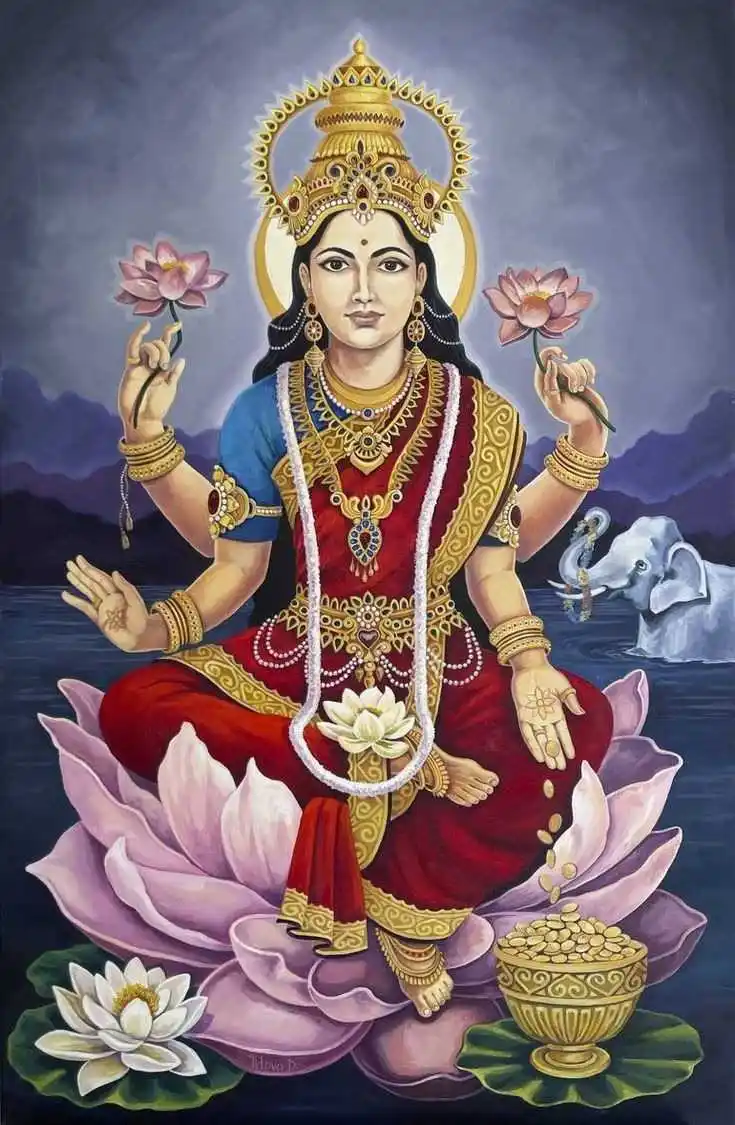 Lakshmi, also known as Shri, is a major goddess in Hinduism who is associated with numerous positive attributes such as wealth, fortune, power, beauty, fertility, prosperity, and Maya (Illusion). Alongside Parvati and Saraswati, they form the Tridevi of Hindu goddesses. The relationship between Vishnu and Lakshmi holds particular prominence within Sri Vaishnavism. In this sect, devotion towards Lakshmi is seen as essential to attain closeness to Vishnu. Belief in Hindu theology suggests that every instance where Vishnu materialized on earth, taking the form of an avatar or incarnation, Lakshmi is said to have joined him as his divine companion. This extends to the iconic sagas of Rama and
Lakshmi, also known as Shri, is a major goddess in Hinduism who is associated with numerous positive attributes such as wealth, fortune, power, beauty, fertility, prosperity, and Maya (Illusion). Alongside Parvati and Saraswati, they form the Tridevi of Hindu goddesses. The relationship between Vishnu and Lakshmi holds particular prominence within Sri Vaishnavism. In this sect, devotion towards Lakshmi is seen as essential to attain closeness to Vishnu. Belief in Hindu theology suggests that every instance where Vishnu materialized on earth, taking the form of an avatar or incarnation, Lakshmi is said to have joined him as his divine companion. This extends to the iconic sagas of Rama and 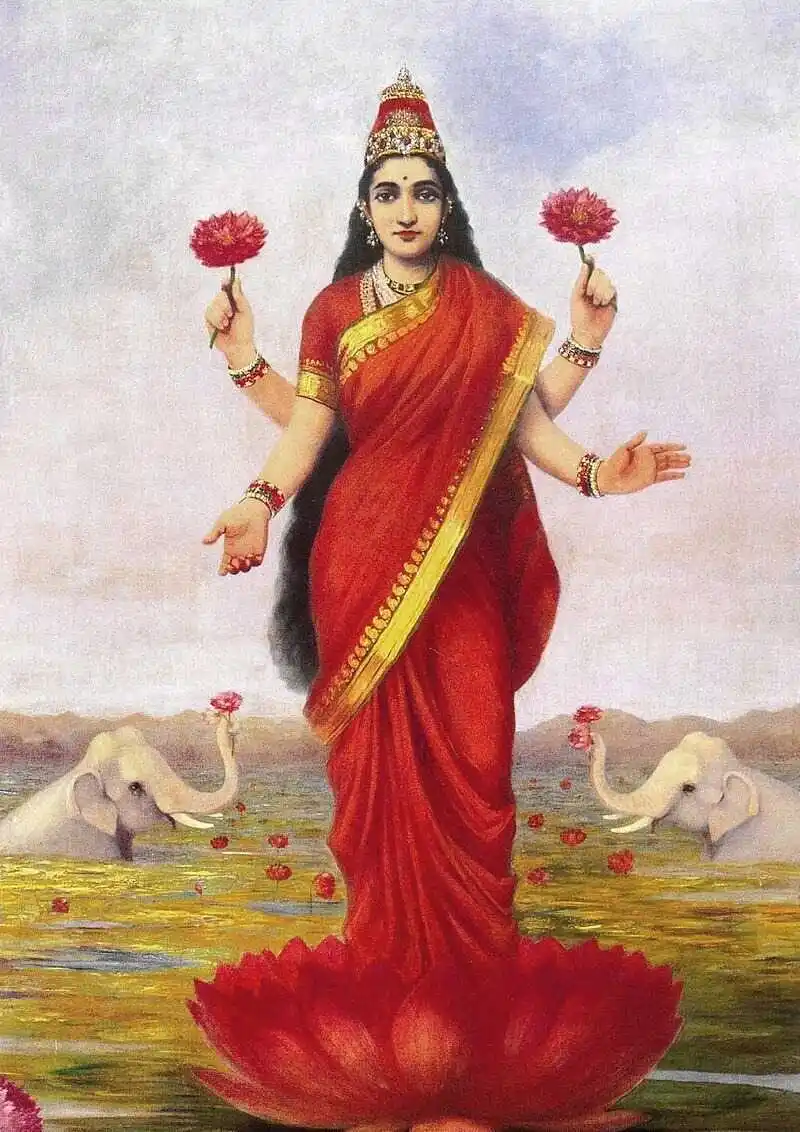
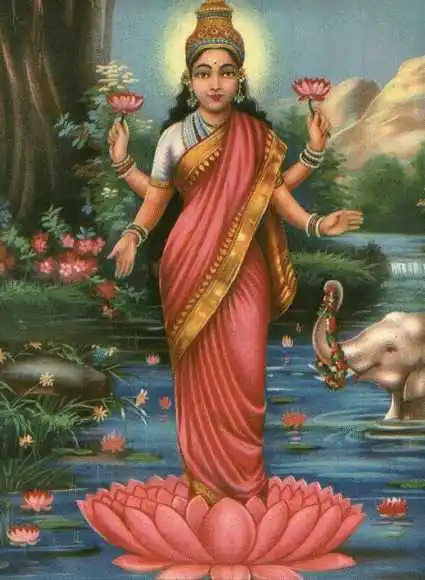
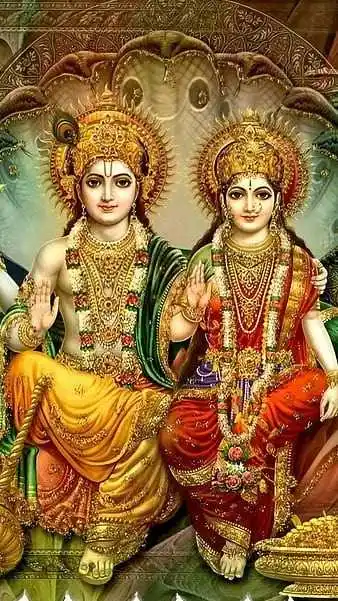

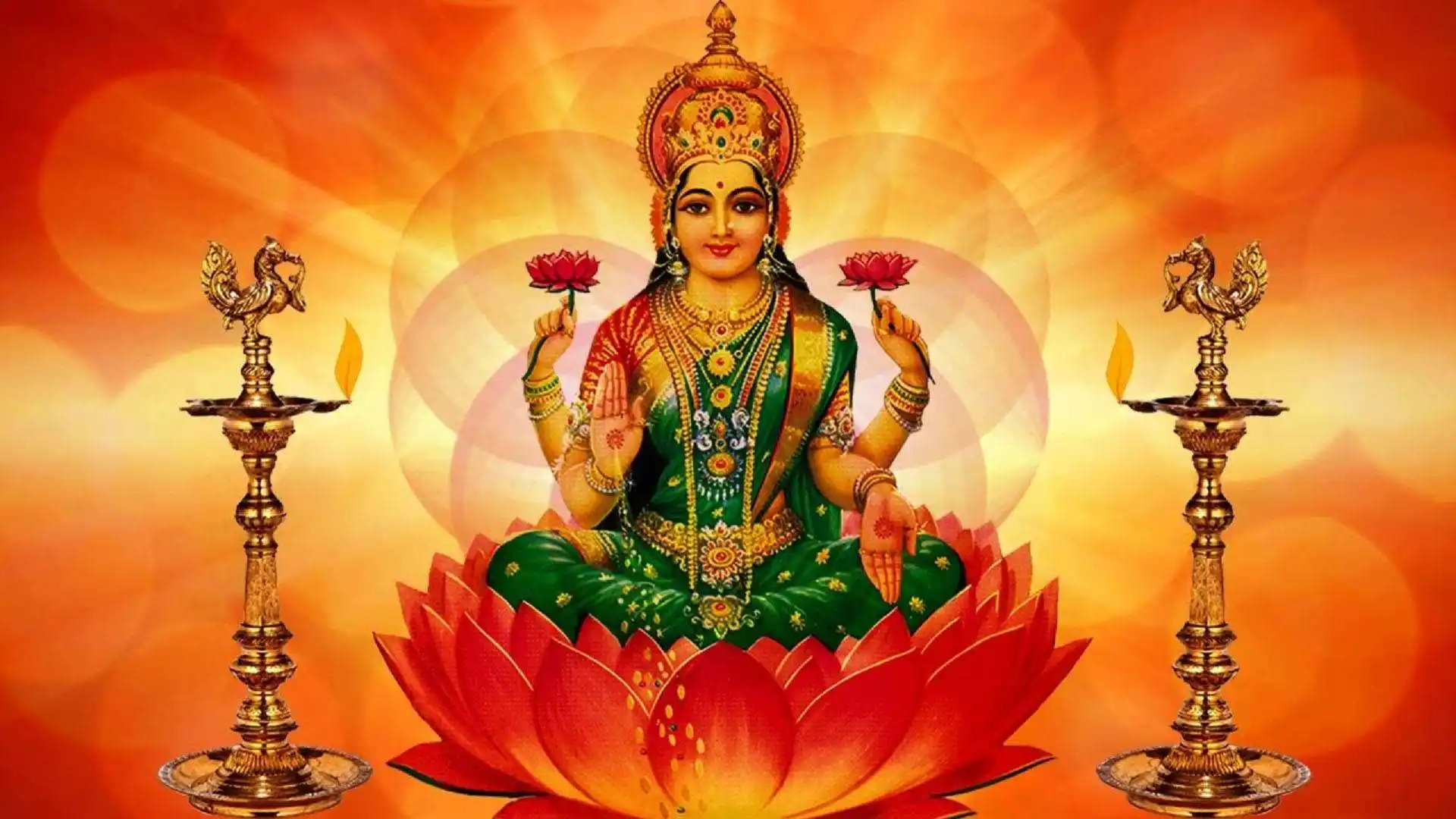
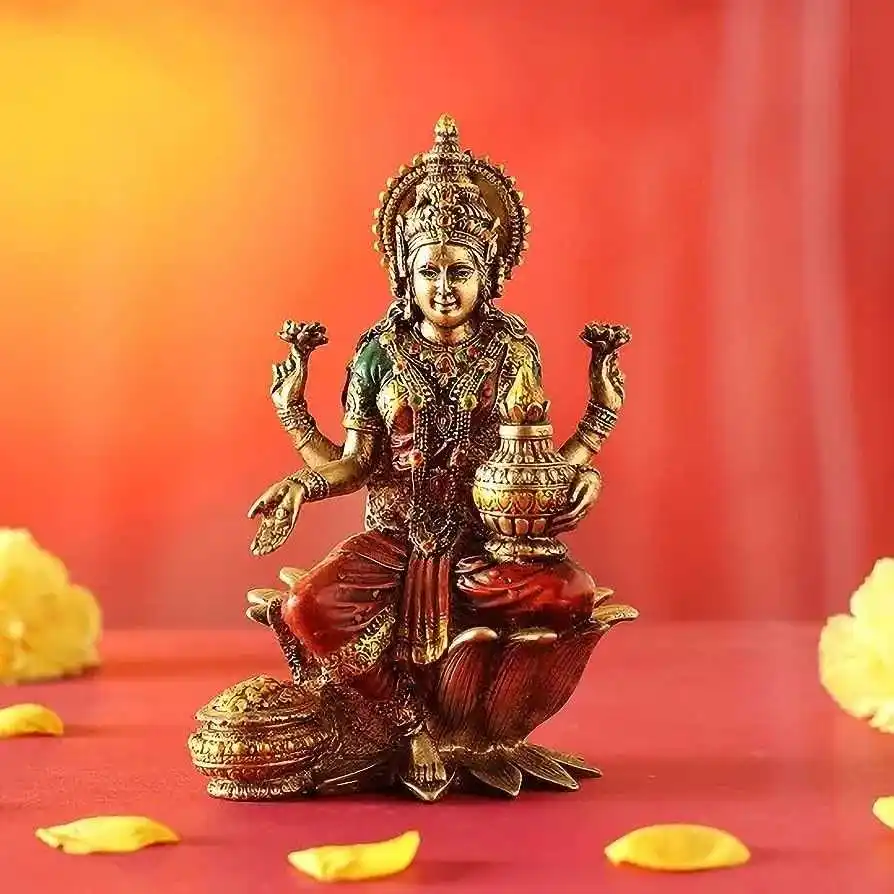
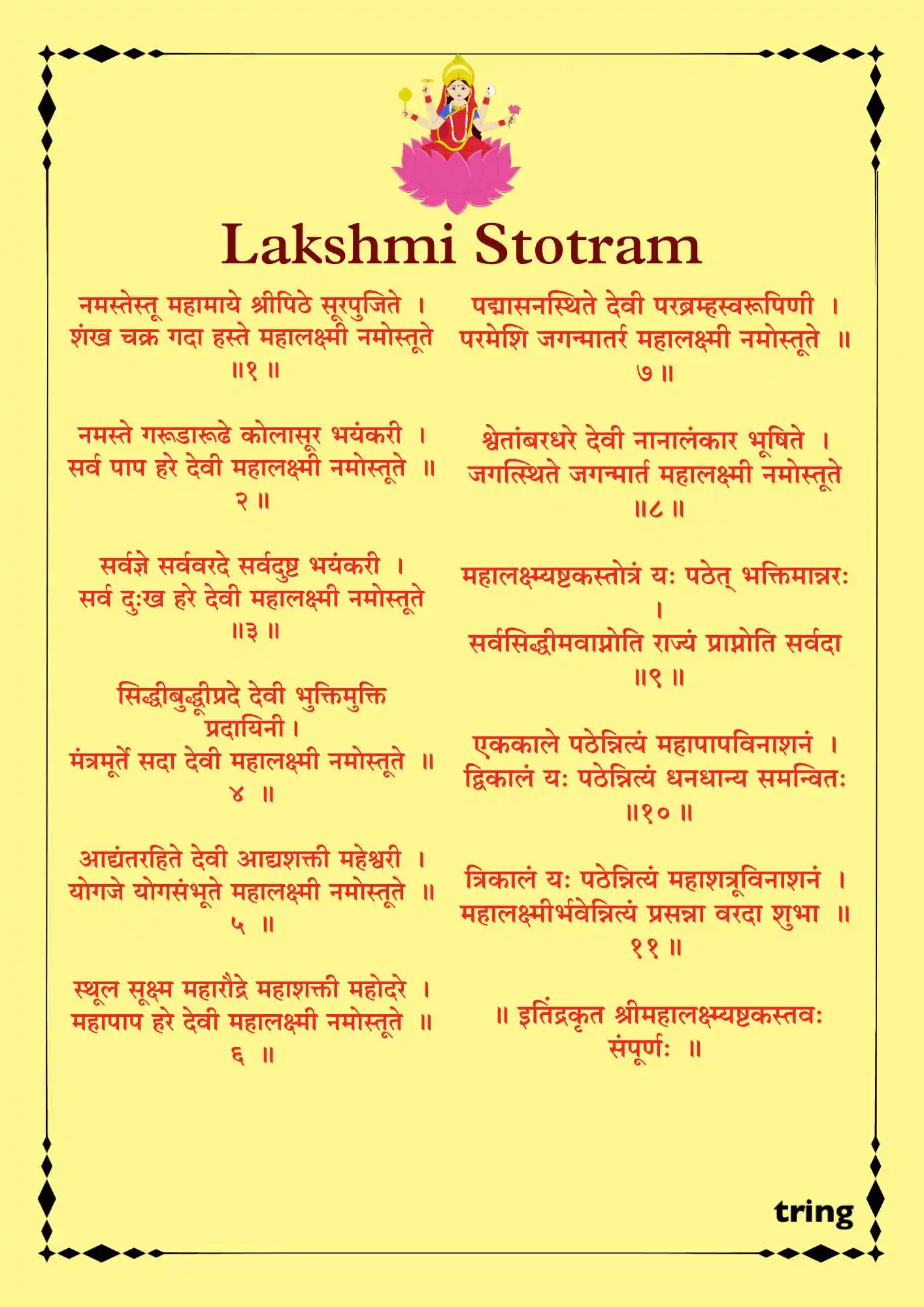
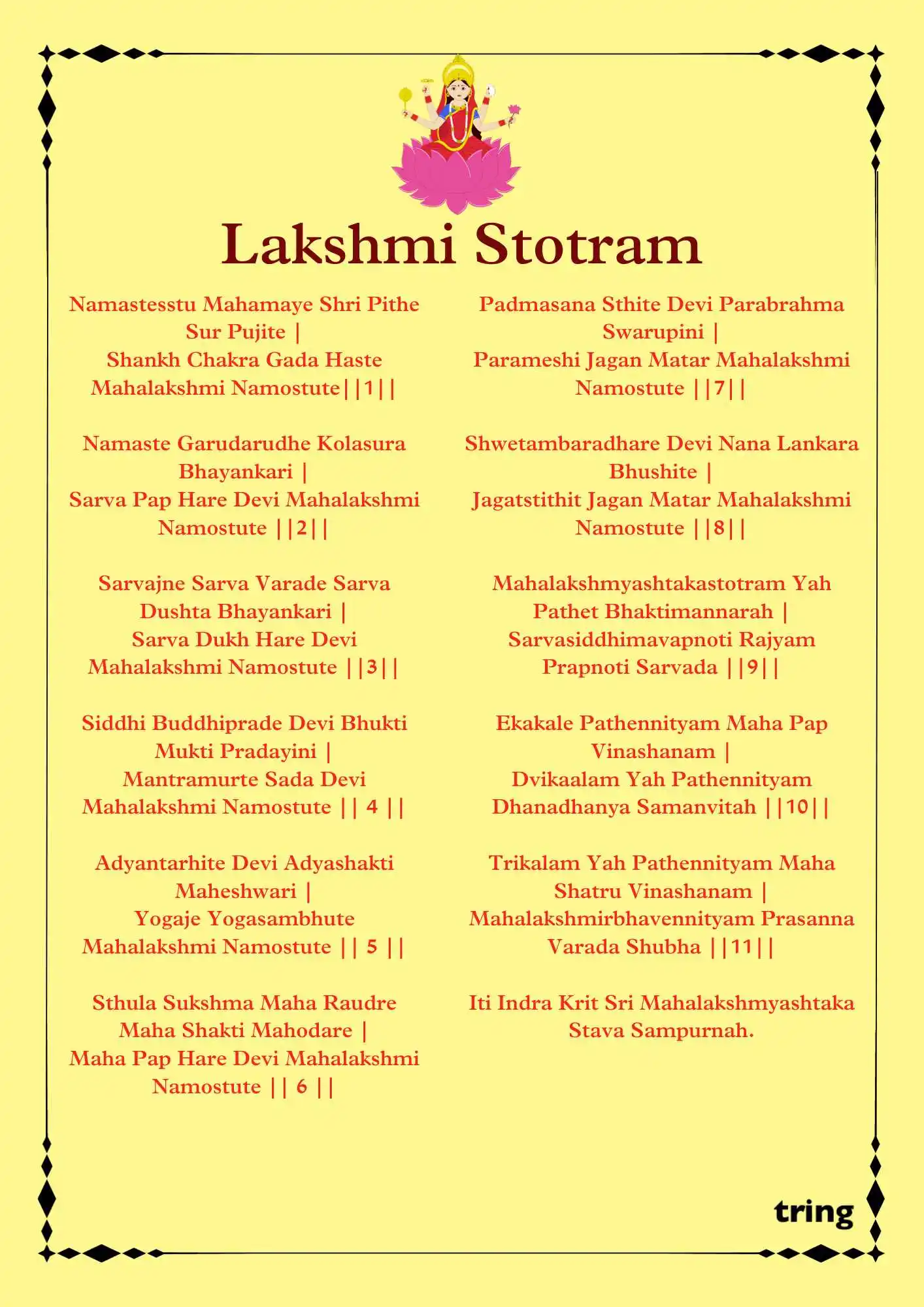
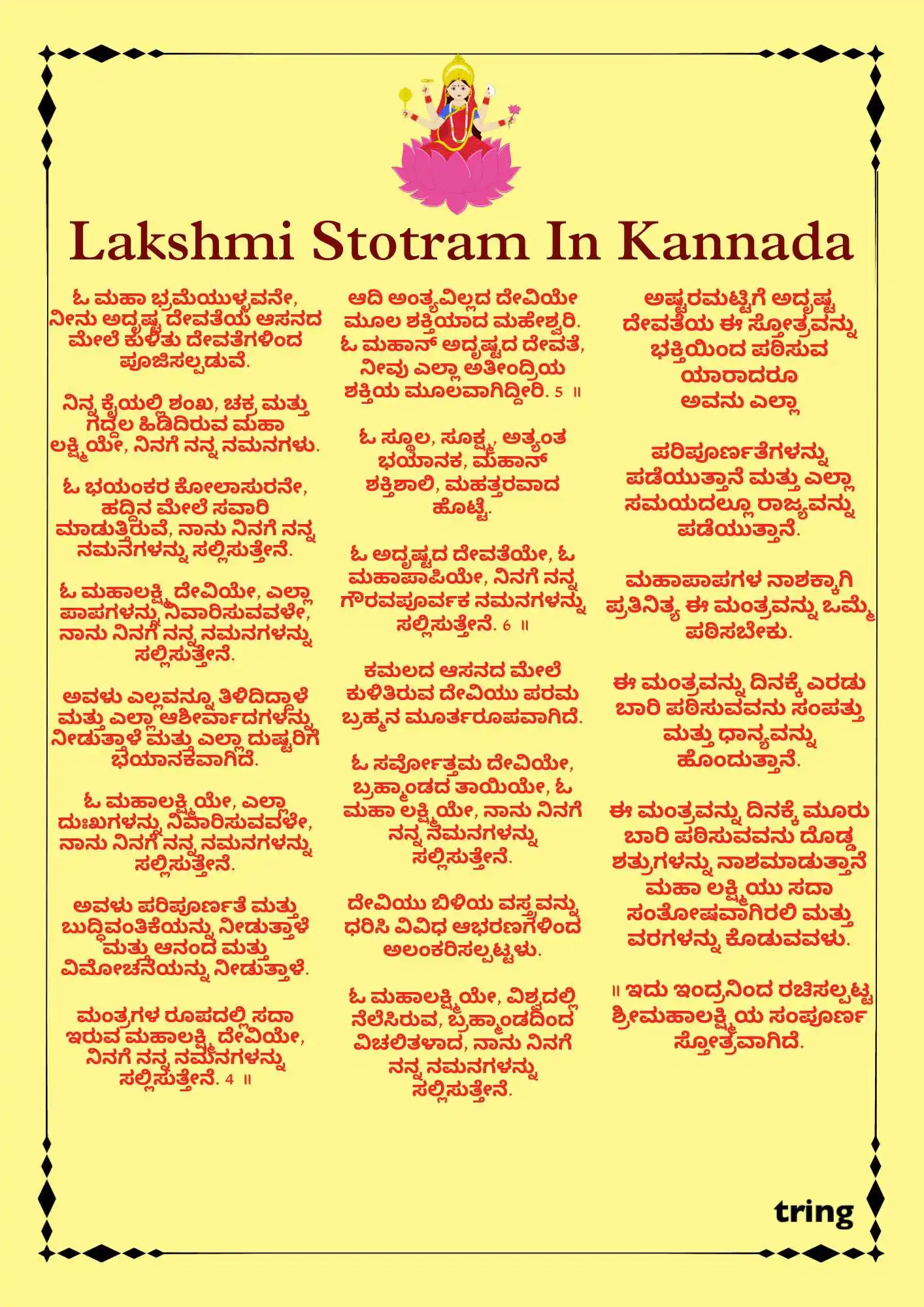
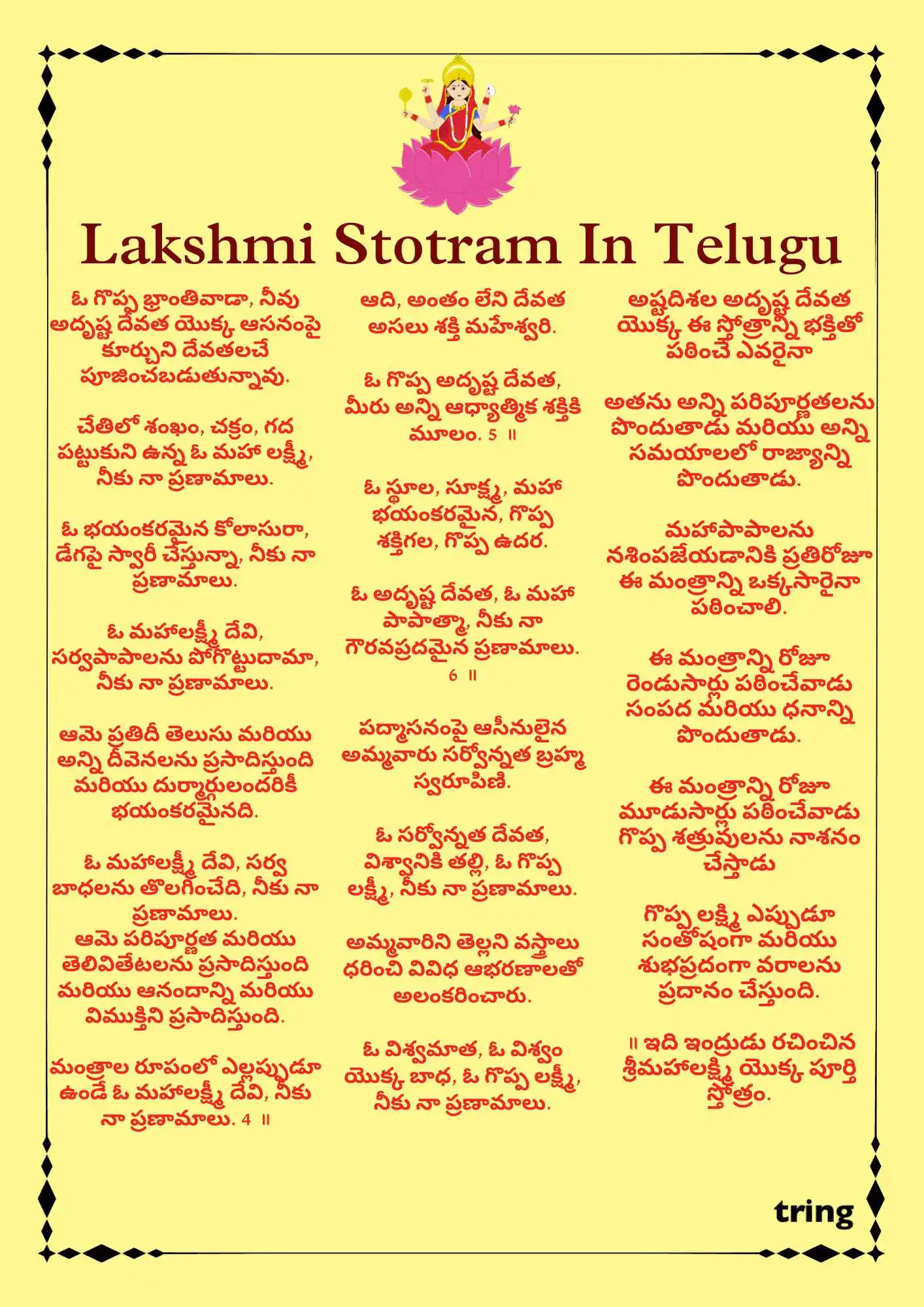








 We now support international payments
We now support international payments
